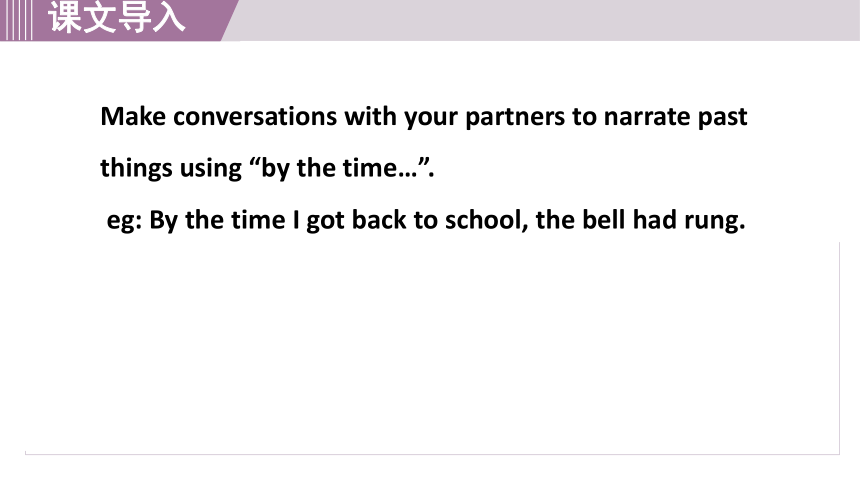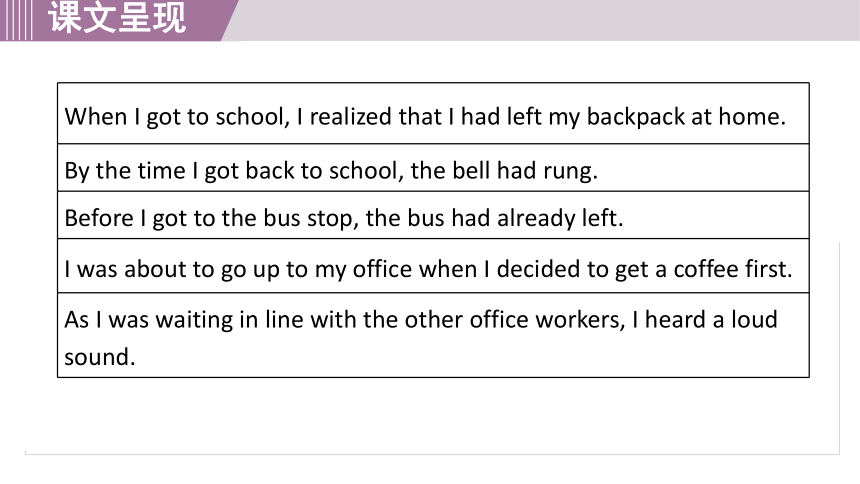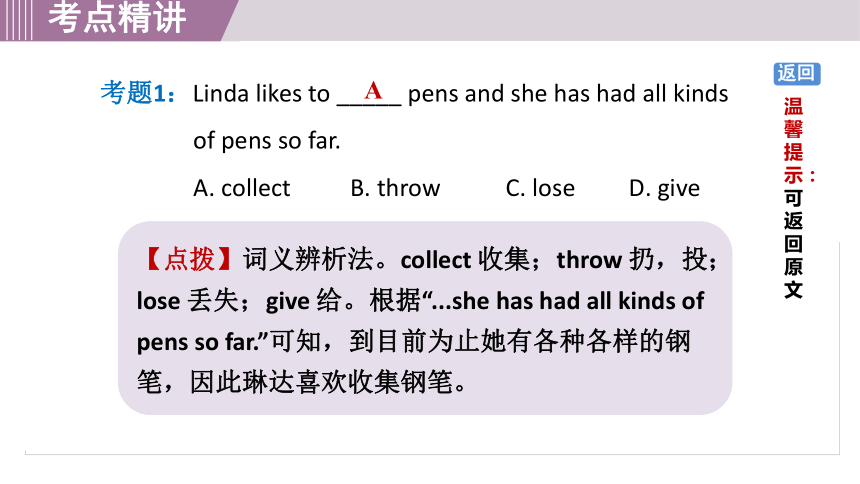九年级英语下册课件Unit 12《Life is full of the unexpected》Section A(Grammar Focus-4c)(共38张PPT)
文档属性
| 名称 | 九年级英语下册课件Unit 12《Life is full of the unexpected》Section A(Grammar Focus-4c)(共38张PPT) |  | |
| 格式 | pptx | ||
| 文件大小 | 38.5MB | ||
| 资源类型 | 教案 | ||
| 版本资源 | 人教新目标(Go for it)版 | ||
| 科目 | 英语 | ||
| 更新时间 | 2025-02-05 16:31:42 | ||
图片预览












文档简介
(共38张PPT)
Period 3 Section A (Grammar Focus-4c)
Unit 12 Life is full of the unexpected.
同学们, 上一课学习的单词、短语和句型, 你们都掌握了吗?现在大家来检验一下, 点击下面的音频开始听写吧!
Make conversations with your partners to narrate past things using “by the time…”.
eg: By the time I got back to school, the bell had rung.
When I got to school, I realized that I had left my backpack at home.
By the time I got back to school, the bell had rung.
Before I got to the bus stop, the bus had already left.
I was about to go up to my office when I decided to get a coffee first.
As I was waiting in line with the other office workers, I heard a loud sound.
4a Make sentences using by the time or before.
1. Tim went into the bathroom.Mary got up.
By the time Mary got up, Tim had already gone into the bathroom.
2. The coffee became cold.I put cream in the coffee.
__________________________________________________
3. The teacher collected the math homework. ① I got to school.
__________________________________________________
__________________________________________________
By the time I put cream in the coffee, it had become cold.
Before I got to school, the teacher had collected the math homework.
4. I completed the work for my boss. The workday ended.
______________________________________________
______________________________________________
5. The movie started.I arrived at the cinema.
________________________________________________
6. My mother finished making the apple pie. I got home from
my language course.
__________________________________________________________________________________________________
By the time I arrived at the cinema, the movie had started.
By the time I got home from my language course, my
mother had finished making the apple pie.
Before the workday ended, I had completed the work
for my boss.
4b Fill in the blanks with the correct forms of the words in the box.
rush out forget arrive at go into show up find out
1. By the time I arrived at the party, everyone else ________ already ______________.
2. When he put the noodles into a bowl, he realized he _____________ to add the green beans.
had
showed up
had forgotten
3.By the time my mother came back from the market, I _____
already ___________ of the door to go to my piano lesson.
4.Before she got to the airport, she _____________ about
the earthquake.
5.When she______________ the movie theater, she remembered she had forgotten to feed her dog. ②
6.Before she got a chance to say goodbye, he _____________
the building. ③
had
rushed out
had found out
arrived at
had gotten into
rush out forget arrive at go into show up find out
4c Write two true statements and one false statement about your day yesterday. Then ask your classmates to guess the false statement.
1. By the time I left for school in the morning,
___________________________________________________
2. By the end of the school day,
_________________________________________________④
3. By dinner time, I _____________________________________
I realized that I had left my keys at home.
I had already finished my homework.
had made the egg soup.
①The teacher collected the math homework.
collect /k 'lekt/ v. 收集
My hobby is collecting stamps. 我的爱好是集邮。
The Book of Songs is the earliest collection of poems in China
and the beginning of the traditional Chinese poetry.
《诗经》是中国最早的诗集,是中国传统诗歌的开端。
A famous collector will give us a talk.
一位著名的收藏家将给我们做一次演讲。
collection n. 收藏品
collector n.
收藏家;收藏者
返回
温馨提示:可返回原文
考题1:Linda likes to _____ pens and she has had all kinds of pens so far.
A. collect B. throw C. lose D. give
A
【点拨】词义辨析法。collect 收集;throw 扔,投;lose 丢失;give 给。根据“...she has had all kinds of pens so far.”可知,到目前为止她有各种各样的钢笔,因此琳达喜欢收集钢笔。
②When she ____ the movie theater, she remembered she had forgotten to feed her dog.
forget to do sth. 忘记做某事
辨析:forget to do sth. 与forget doing sth.
forget to do sth. 忘记去做某事(事情未做) 。
forget doing sth. 忘记做过某事(事情已做) 。
He was so excited that he forgot to introduce himself.
他太激动了以至于忘记介绍自己了。
Mary dances very well. I’ll never forget seeing her dance for the first time.
玛丽舞跳得很好。我永远也不会忘记第一次看她跳舞(的情景) 。
拓展:remember 为forget 的反义词, 它的用法与forget 相同。
remember to do sth. 记得要做某事
remember doing sth. 记得做过某事
返回
考题2:To save energy, don’t forget _____ the light before you leave the room.
A. turn off B. turning off C. to turn off
【点拨】turn off 关掉。forget to do sth. 忘记去做某事,固定用法。根据句意可知,是不要忘记在离开房间前去关灯。
C
③Before she got a chance to say goodbye, he ____ the building.
get the chance to do sth. 得到做某事的机会
get (have) a chance to do sth. =get (have) a chance of (doing) sth.得到做某事的机会,其中chance 作名词,意为“机会”。
含chance 的其他常见短语:lose a chance 失去机会
take a chance 冒险 by chance 偶然地
Li Ming hopes to get a chance to raise the national flag on the playground.
李明希望有机会在操场上升国旗。
If you work hard and believe in yourself, you can have a
chance to succeed.
如果你努力工作并且相信自己,你就有机会成功。
返回
④By the end of the school day, ________
by the end of 在(某时间点) 以前
by the end of 与表示时间的名词连用, 通常根据by the end of 之后时间的不同, 句子选用相应的时态:
(1) 接表示将来的时间, 句子用一般将来时。
By the end of next month, I will finish reading the book.
到下个月底, 我将读完这本书。
(2) 接表示现在的时间,句子用现在完成时。
By the end of this week, my sister has learned five English songs.
到这周末,我妹妹已经学了五首英文歌曲。
(3) 接表示过去的时间,句子用过去完成时。
By the end of last year, thousands of trees had been planted in this city. 到去年年底,这个城市有成千上万棵树已被种植。
辨析:by the end of, at the end of 与in the end
by the end of “在……之前”, 仅指时间。
at the end of “在……结束时;在……尽头”, 指时间或地点。强调一段时间的结束点或某段路程的终止处。
in the end “最后;终于”, 位于句首或句末, 表示事情已结束。
By the end of last year, they had seen six English films.
到去年年底,他们已经看了六部英文电影。
My father always waits for me at the end of the road.
我父亲总是在路的尽头等我。
What decision did she make in the end
最后她做了什么决定?
考题3:—打扰一下,我可以借这本书吗?
—当然可以,但你必须在这学期末还回来。
—Excuse me, can I borrow this book
—Sure, but you must return it ________ ________ ________ ________ this term.
by the end
of
返回
过去 完成时 概述 过去完成时表示某一动作或状态在过去某一时间或动作之前已经发生或完成。也可以指过去的动作或状态延续到过去的某一时刻。它表示动作发生的时间是“过去的过去”。
句式结构 肯定句: 主语+ had + 过去分词+ 其他. ①
否定句: 主语+ hadn’t + 过去分词+ 其他. ②
一般疑问句及答语: Had + 主语+ 过去分词+ 其他
肯定回答: Yes, 主语+ had.
否定回答: No, 主语+ hadn’t. ③
过去 完成时 用法 表示在过去某一时刻或动作之前已经发生或完成了的动作,常和by, before 或by the end of 构成的介词短语及by the time 或until 引导的时间
状语从句连用。④
表示从过去的某一时刻开始,一直持续到过去另一时间的动作或状态,常和for 或since 构成的时间状语连用。⑤
图解助记:
1 When I got to the airport, I realized I had left my passport at home.
当我到达机场时,我意识到我把我的护照忘在家里了。
特别提醒: 过去完成时是一个相对的时态,只有和过去的某个时间或动作相比较时才会用到,因此可通过分析语境来确定时态。
返回
2 I hadn’t finished my homework when my mother came back.
我妈妈回来的时候,我还没有完成作业。
考题1:Her mother had already gone to work by the time she got up. (变为否定句)
Her mother ________ gone to work ________ by the time she got up.
hadn’t yet
【点拨】含有过去完成时的句子变否定句时要在had后加not。already用于肯定句,yet用于疑问句或否定句。
返回
3 — Had they finished the work when you got there
你们到达那里时他们完成工作了吗?
— Yes, they had. /No, they hadn’t.
是的,他们完成了。/不,他们没完成。
返回
4 By the end of last month, I had collected 800 Chinese stamps.
到上个月末,我已经收集了八百张中国邮票。
By the time I finished my homework, the TV program had been over.
当我完成我的作业的时候,电视节目已经结束了。
考题2:The movie is boring. By the time the movie ended, I ______ asleep.
A. have fallen B. fallen
C. had fallen D. falls
【点拨】句意:这部电影很无聊。电影结束的时候,我已经睡着了。由于“电影结束”是一个过去的动作,描述这个时刻之前已经发生的事情,即“过去的过去”,用过去完成时。
C
返回
5 They had been in love with each other for five years before they got married at last. 他们相爱了五年,终于结婚了。
I heard that Uncle Zhao had travelled to more than 20 countries since 2010.
我听说从2010 年开始,赵叔叔已经去过二十多个国家了。
易错点:(1) 过去完成时经常用于主句为一般过去时的宾语从句中,表示从句动作先于主句动作发生,如在told, said, knew, heard, thought 等动词后的宾语从句中。
He said that he had worked in that school for ten years.
他说他已经在那所学校工作了十年。
Not until this morning did I realize I had left my key in the car.
直到今天早上,我才意识到我把钥匙落在车里了。
She told me that she had already arrived in Paris.
她告诉我,她已经到巴黎了。
考题3:You told me you had _______ (deal) with these letters. Why are they still here
【点拨】用语法判定法解题。过去完成时的结构为“had + 动词的过去分词”。分析题目可知用deal 的过去分词形式。
dealt
(2) 在表示过去某一动作或状态的句子中,常出现与完成时态连用的词,如:already, yet, since, for, ever, never 及表次数的词,此时句子常用过去完成时。
I met Jim in the street yesterday. We hadn’t seen each other since he went to Beijing.
我昨天在街上碰见了吉姆。自从他去北京后,我们彼此还没有见过面。
You arrived too late. They had left already. 你到得太晚了。他们已经离开了。
When I got to the bus stop, the bus had been away for 5 minutes.
当我到达公交车站时,公交车已经离开五分钟了。
考题4:Although he ____________ (fail) many times, he never gave up.
had failed
特别提醒:
(1) 叙述过去连续发生的两件及两件以上的事情时,虽然时间上有先后之别,但仍用一般过去时。
(2) 在包含before, after, when, until, as soon as 等引导的时间状语从句的复合句中,如果主句的动作和从句的动作紧接着发生,则主从句均用一般过去时。
返回
本节课主要学习了过去完成时态的意义和用法, 了解了中考对这类题的考查角度, 掌握了这类题的做题方法。
Period 3 Section A (Grammar Focus-4c)
Unit 12 Life is full of the unexpected.
同学们, 上一课学习的单词、短语和句型, 你们都掌握了吗?现在大家来检验一下, 点击下面的音频开始听写吧!
Make conversations with your partners to narrate past things using “by the time…”.
eg: By the time I got back to school, the bell had rung.
When I got to school, I realized that I had left my backpack at home.
By the time I got back to school, the bell had rung.
Before I got to the bus stop, the bus had already left.
I was about to go up to my office when I decided to get a coffee first.
As I was waiting in line with the other office workers, I heard a loud sound.
4a Make sentences using by the time or before.
1. Tim went into the bathroom.Mary got up.
By the time Mary got up, Tim had already gone into the bathroom.
2. The coffee became cold.I put cream in the coffee.
__________________________________________________
3. The teacher collected the math homework. ① I got to school.
__________________________________________________
__________________________________________________
By the time I put cream in the coffee, it had become cold.
Before I got to school, the teacher had collected the math homework.
4. I completed the work for my boss. The workday ended.
______________________________________________
______________________________________________
5. The movie started.I arrived at the cinema.
________________________________________________
6. My mother finished making the apple pie. I got home from
my language course.
__________________________________________________________________________________________________
By the time I arrived at the cinema, the movie had started.
By the time I got home from my language course, my
mother had finished making the apple pie.
Before the workday ended, I had completed the work
for my boss.
4b Fill in the blanks with the correct forms of the words in the box.
rush out forget arrive at go into show up find out
1. By the time I arrived at the party, everyone else ________ already ______________.
2. When he put the noodles into a bowl, he realized he _____________ to add the green beans.
had
showed up
had forgotten
3.By the time my mother came back from the market, I _____
already ___________ of the door to go to my piano lesson.
4.Before she got to the airport, she _____________ about
the earthquake.
5.When she______________ the movie theater, she remembered she had forgotten to feed her dog. ②
6.Before she got a chance to say goodbye, he _____________
the building. ③
had
rushed out
had found out
arrived at
had gotten into
rush out forget arrive at go into show up find out
4c Write two true statements and one false statement about your day yesterday. Then ask your classmates to guess the false statement.
1. By the time I left for school in the morning,
___________________________________________________
2. By the end of the school day,
_________________________________________________④
3. By dinner time, I _____________________________________
I realized that I had left my keys at home.
I had already finished my homework.
had made the egg soup.
①The teacher collected the math homework.
collect /k 'lekt/ v. 收集
My hobby is collecting stamps. 我的爱好是集邮。
The Book of Songs is the earliest collection of poems in China
and the beginning of the traditional Chinese poetry.
《诗经》是中国最早的诗集,是中国传统诗歌的开端。
A famous collector will give us a talk.
一位著名的收藏家将给我们做一次演讲。
collection n. 收藏品
collector n.
收藏家;收藏者
返回
温馨提示:可返回原文
考题1:Linda likes to _____ pens and she has had all kinds of pens so far.
A. collect B. throw C. lose D. give
A
【点拨】词义辨析法。collect 收集;throw 扔,投;lose 丢失;give 给。根据“...she has had all kinds of pens so far.”可知,到目前为止她有各种各样的钢笔,因此琳达喜欢收集钢笔。
②When she ____ the movie theater, she remembered she had forgotten to feed her dog.
forget to do sth. 忘记做某事
辨析:forget to do sth. 与forget doing sth.
forget to do sth. 忘记去做某事(事情未做) 。
forget doing sth. 忘记做过某事(事情已做) 。
He was so excited that he forgot to introduce himself.
他太激动了以至于忘记介绍自己了。
Mary dances very well. I’ll never forget seeing her dance for the first time.
玛丽舞跳得很好。我永远也不会忘记第一次看她跳舞(的情景) 。
拓展:remember 为forget 的反义词, 它的用法与forget 相同。
remember to do sth. 记得要做某事
remember doing sth. 记得做过某事
返回
考题2:To save energy, don’t forget _____ the light before you leave the room.
A. turn off B. turning off C. to turn off
【点拨】turn off 关掉。forget to do sth. 忘记去做某事,固定用法。根据句意可知,是不要忘记在离开房间前去关灯。
C
③Before she got a chance to say goodbye, he ____ the building.
get the chance to do sth. 得到做某事的机会
get (have) a chance to do sth. =get (have) a chance of (doing) sth.得到做某事的机会,其中chance 作名词,意为“机会”。
含chance 的其他常见短语:lose a chance 失去机会
take a chance 冒险 by chance 偶然地
Li Ming hopes to get a chance to raise the national flag on the playground.
李明希望有机会在操场上升国旗。
If you work hard and believe in yourself, you can have a
chance to succeed.
如果你努力工作并且相信自己,你就有机会成功。
返回
④By the end of the school day, ________
by the end of 在(某时间点) 以前
by the end of 与表示时间的名词连用, 通常根据by the end of 之后时间的不同, 句子选用相应的时态:
(1) 接表示将来的时间, 句子用一般将来时。
By the end of next month, I will finish reading the book.
到下个月底, 我将读完这本书。
(2) 接表示现在的时间,句子用现在完成时。
By the end of this week, my sister has learned five English songs.
到这周末,我妹妹已经学了五首英文歌曲。
(3) 接表示过去的时间,句子用过去完成时。
By the end of last year, thousands of trees had been planted in this city. 到去年年底,这个城市有成千上万棵树已被种植。
辨析:by the end of, at the end of 与in the end
by the end of “在……之前”, 仅指时间。
at the end of “在……结束时;在……尽头”, 指时间或地点。强调一段时间的结束点或某段路程的终止处。
in the end “最后;终于”, 位于句首或句末, 表示事情已结束。
By the end of last year, they had seen six English films.
到去年年底,他们已经看了六部英文电影。
My father always waits for me at the end of the road.
我父亲总是在路的尽头等我。
What decision did she make in the end
最后她做了什么决定?
考题3:—打扰一下,我可以借这本书吗?
—当然可以,但你必须在这学期末还回来。
—Excuse me, can I borrow this book
—Sure, but you must return it ________ ________ ________ ________ this term.
by the end
of
返回
过去 完成时 概述 过去完成时表示某一动作或状态在过去某一时间或动作之前已经发生或完成。也可以指过去的动作或状态延续到过去的某一时刻。它表示动作发生的时间是“过去的过去”。
句式结构 肯定句: 主语+ had + 过去分词+ 其他. ①
否定句: 主语+ hadn’t + 过去分词+ 其他. ②
一般疑问句及答语: Had + 主语+ 过去分词+ 其他
肯定回答: Yes, 主语+ had.
否定回答: No, 主语+ hadn’t. ③
过去 完成时 用法 表示在过去某一时刻或动作之前已经发生或完成了的动作,常和by, before 或by the end of 构成的介词短语及by the time 或until 引导的时间
状语从句连用。④
表示从过去的某一时刻开始,一直持续到过去另一时间的动作或状态,常和for 或since 构成的时间状语连用。⑤
图解助记:
1 When I got to the airport, I realized I had left my passport at home.
当我到达机场时,我意识到我把我的护照忘在家里了。
特别提醒: 过去完成时是一个相对的时态,只有和过去的某个时间或动作相比较时才会用到,因此可通过分析语境来确定时态。
返回
2 I hadn’t finished my homework when my mother came back.
我妈妈回来的时候,我还没有完成作业。
考题1:Her mother had already gone to work by the time she got up. (变为否定句)
Her mother ________ gone to work ________ by the time she got up.
hadn’t yet
【点拨】含有过去完成时的句子变否定句时要在had后加not。already用于肯定句,yet用于疑问句或否定句。
返回
3 — Had they finished the work when you got there
你们到达那里时他们完成工作了吗?
— Yes, they had. /No, they hadn’t.
是的,他们完成了。/不,他们没完成。
返回
4 By the end of last month, I had collected 800 Chinese stamps.
到上个月末,我已经收集了八百张中国邮票。
By the time I finished my homework, the TV program had been over.
当我完成我的作业的时候,电视节目已经结束了。
考题2:The movie is boring. By the time the movie ended, I ______ asleep.
A. have fallen B. fallen
C. had fallen D. falls
【点拨】句意:这部电影很无聊。电影结束的时候,我已经睡着了。由于“电影结束”是一个过去的动作,描述这个时刻之前已经发生的事情,即“过去的过去”,用过去完成时。
C
返回
5 They had been in love with each other for five years before they got married at last. 他们相爱了五年,终于结婚了。
I heard that Uncle Zhao had travelled to more than 20 countries since 2010.
我听说从2010 年开始,赵叔叔已经去过二十多个国家了。
易错点:(1) 过去完成时经常用于主句为一般过去时的宾语从句中,表示从句动作先于主句动作发生,如在told, said, knew, heard, thought 等动词后的宾语从句中。
He said that he had worked in that school for ten years.
他说他已经在那所学校工作了十年。
Not until this morning did I realize I had left my key in the car.
直到今天早上,我才意识到我把钥匙落在车里了。
She told me that she had already arrived in Paris.
她告诉我,她已经到巴黎了。
考题3:You told me you had _______ (deal) with these letters. Why are they still here
【点拨】用语法判定法解题。过去完成时的结构为“had + 动词的过去分词”。分析题目可知用deal 的过去分词形式。
dealt
(2) 在表示过去某一动作或状态的句子中,常出现与完成时态连用的词,如:already, yet, since, for, ever, never 及表次数的词,此时句子常用过去完成时。
I met Jim in the street yesterday. We hadn’t seen each other since he went to Beijing.
我昨天在街上碰见了吉姆。自从他去北京后,我们彼此还没有见过面。
You arrived too late. They had left already. 你到得太晚了。他们已经离开了。
When I got to the bus stop, the bus had been away for 5 minutes.
当我到达公交车站时,公交车已经离开五分钟了。
考题4:Although he ____________ (fail) many times, he never gave up.
had failed
特别提醒:
(1) 叙述过去连续发生的两件及两件以上的事情时,虽然时间上有先后之别,但仍用一般过去时。
(2) 在包含before, after, when, until, as soon as 等引导的时间状语从句的复合句中,如果主句的动作和从句的动作紧接着发生,则主从句均用一般过去时。
返回
本节课主要学习了过去完成时态的意义和用法, 了解了中考对这类题的考查角度, 掌握了这类题的做题方法。
同课章节目录
- Unit 1 How can we become good learners.
- Section A
- Section B
- Unit 2 I think that mooncakes are delicious!
- Section A
- Section B
- Unit 3 Could you please tell me where the restroom
- Section A
- Section B
- Unit 4 I used to be afraid of the dark.
- Section A
- Section B
- Unit 5 What are the shirts made of?
- Section A
- Section B
- Review of Units 1-5
- Unit 6 When was it invented?
- Section A
- Section B
- Unit 7 Teenagers should be allowed to choose their
- Section A
- Section B
- Unit 8 It must belong to Carla.
- Section A
- Section B
- Unit 9 I like music that I can dance to.
- Section A
- Section B
- Unit 10 You're supposed to shake hands.
- Section A
- Section B
- Review of Units 6-10
- Unit 11 Sad movies make me cry.
- Section A
- Section B
- Unit 12 Life is full of the unexpected
- Section A
- Section B
- Unit 13 We're trying to save the earth!
- Section A
- Section B
- Unit 14 I remember meeting all of you in Grade 7.
- Section A
- Section B
- Review of Units 11-14
